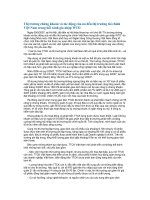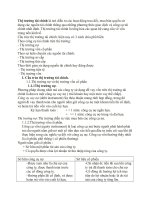financial markets(thị trường tài chính)
Bạn đang xem bản rút gọn của tài liệu. Xem và tải ngay bản đầy đủ của tài liệu tại đây (5.82 MB, 74 trang )
GROUP 6
Lê Thị Quỳnh
Lê Thị Thanh Thảo
Nguyễn Đức Thịnh
Chu Thị Thùy
FINANCIAL
MARKETS
1
CONTENT
I
The Money Market
II
The Foreign Exchange Market
III
The Bond Market
IV
2
I. The Money Market
3
I. The Money Market
01
02
Definitions Characteristics
03
Purposes
04
Operation
4
I. The Money Market
1. Definition
Financial market in which
only short-term debt
instruments (generally
those with original maturity
of less than 1 year) are
traded
It is used by participants
as a mean for borrowing
and lending in the short
term,with maturities that
usually range
from
overnight to under a
year.
Note: money-currency- is not traded in the money markets
5
I. The Money Market - 2. Characteristics
MARKET
No particular trading places.
SECURITIES
Wholesale markets with large
transactions (>1m dollars)
Sold in large denominations
Prevent most individual investor from
directly participating.
Have low default risk
Flexible and innovative
Mature in one year or less,
normally less than 120 days
Small investors can access
to money market
6
Toward
investors
3. The Money
market purposes
Toward
borrowers
7
I. The Money Market – 3. Purposes
TOWARD INVESTORS
3.1.To “warehouse” the surplus funds
3.1
3.2
3.3
3.2.Provide a higher return than holding
.cash and money in banks
3.3.A means to invest idle funds and
to reduce opportunity cost
8
I. The Money Market – 3. Purposes
TOWARD INVESTORS
3.1. To “warehouse” the surplus funds
An ideal place for a firm or financial institution
to
“warehouse” surplus funds until they are needed
9
I. The Money Market – 3. Purposes
TOWARD INVESTORS
3.2.Provide a higher return than holding cash and
money in banks
Investors are people who are temporarily warehousing funds
and not trying to earn unusual high returns
use this market as an interim investment that provides a higher
return than holding cash or money in banks
10
I. The Money Market – 3. Purposes
TOWARD INVESTORS
3.3. A means to invest idle funds and to reduce opportunity
cost
Holding idle surplus cash is expensive
01
02
03
Idle cash represents an opportunity cost
The money markets provide a mean to invest
idle funds and to reduce this opportunity cost
11
I. The Money Market – 3. Purposes
TOWARD BORROWERS
3.3. A means to invest idle funds and to reduce opportunity
cost
Cash inflows and outflows
rarely happen at the same time
Government tax revenues usually come only at certain times
of the year- expenses are incurred all year long
Businesses also face problems caused by revenues and
expenses occurring at different times.
01
02
12
I. The Money Market
4. Operation
Participants
13
I. The Money Market – 4. Operation
4.1. Participants
U.S Treasury
Federal
Department
Reserve
System
Commercial
banks
Businesses
Investment
and
securities
firms
Individuals
14
I. The Money Market
4. Operation – 4.1. Participants
Always be a demander of money market funds and
never be a supplier.
The largest of all money market borrowers
U.S Treasury
Department
Role: Sell U.S securities that are popular with other
participants (e.g: T-bills) to fund the national debt.
Short-term issues enable the government to raise
funds until tax revenues are received.
15
I. The Money Market
4. Operation – 4.1. Participants
Federal
Reserve
System
Treasury’s agent
for the distribution
of all Government
securities.
Role: Buys and
sells U.S Treasury
securities as its
primary method
of
controlling the
money supply
Money supply
should be expanded
=> purchase
Treasury securities
16
I. The Money Market- 4. Operation- 4.1.Participants
01
Hold a percentage of U.S government
securities to pension funds
02
03
Commercial
banks
Prohibited from owning risky securities
(stocks and bonds)
Many trade on behalf of customers
04
Buy U.S Treasury securities; sell certificates of
deposit and make short-term loans, offer individual
investors accounts that
invest in money market 17
securities.
Role:
A. THE MONEY MARKETS- IV. OPERATION- 1.PARTICIPANTS
Businesses use money markets both to “warehouse”
surplus funds and to raise short-term funds.
Businesses
Role: Buy and sell various short-term securities as
a regular part of their cash management.
18
I. The Money Market
4. Operation - 4.1. Participants
Investment Companies
(brokerage firms)
Large diversified brokerage
firms (dealers) are active in the
money markets
Investment
and
Role: Importance to the
Securities liquidity because they ensure
that sellers can readily market
firms
their securities.
Finance Companies
(commercial leasing co.)
Raise fund in the money market
by selling commercial paper
Role: Lend funds to individuals
for the purchase of durable
goods (cars, boats,...)
19
I. The Money Market
4. Operation – 4.1. Participants
Insurance Companies
(property and casualty
insurance companies)
Investment
and
Securities
firms
Must maintain liquidity
needed to meet unexpected
demands by selling some
of their money market
securities to raise cash
Pension Funds
Have sufficient liquidity to
maintain funds in money
market instruments in
readiness for investment in
stocks and bonds
20
I. The Money Market
4. Operation – 4.1. Participants
The advantage of mutual funds is that they give
investors with relatively small amounts of cash to
large-denomination securities.
Individuals
Role: Buy money market mutual funds
21
II
.
The Foreign
Market (Forex, FX)
22
CONTE
NT
2.1
2.2
2.3
2.4
Definition
Operation
Characteristics
Exchange
Rates in
the Long Run
2.5
Spot (or Current )
Exchange
Rates in the Short
Run : A
Supply and Demand
Analysis
23
2.
1
Definiti
on (also known as Forex, FX or the
The foreign exchange market
currency market)
is an over-the-counter (OTC) global marketplace that determines the
exchange rate for currencies around the world.
24
Exchange Rates ?
An exchange rate is the value of one nation's
currency Vs the currency of another nation.
23.200 VND / $1
Affect the value of a currency.
A currency increases in
value – appreciation.
A currency falls
in value - depreciation
25









